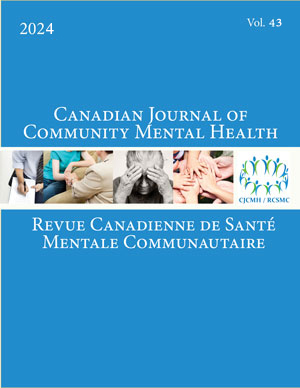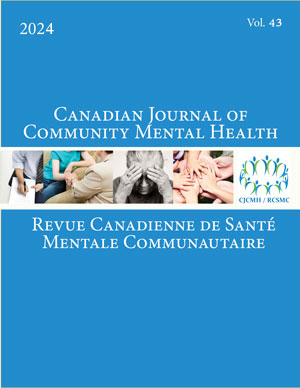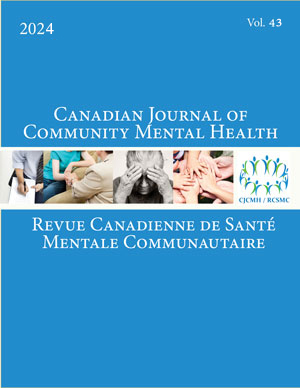Volume 37 • Number 1 • May 2018
Articles
FREE ACCESS
Transitions (2nd edition) is an evidence-based life-skills resource designed to help post-secondary students transition from high school to college or university. This study was an on-campus evaluation of peer-led seminars of the mental health content from Transitions. A cross-sectional survey was conducted to assess the mental health literacy of three groups of students: master trainers, student trainers, and seminar participants. Post-seminar, there were significant improvements in mental health knowledge and help-seeking, two key components of participants’ mental health literacy. This peer-led approach is a feasible option with the potential to improve student mental health literacy within a short time frame.
FREE ACCESS
Le présent article décrit le lien entre la santé mentale et l’identité ethnolinguistique des étudiantes et étudiants d’un établissement d’enseignement postsecondaire francophone en contexte linguistique minoritaire dans l’Ouest canadien. Dans l’ensemble, les Franco-Manitobains affichaient une forte identité ethnolinguistique et une meilleure santé mentale. En revanche, les francophones d’un autre pays étaient plus à risque d’éprouver un problème de santé mentale, et ce, malgré une forte identité ethnolinguistique. À l’évidence, pour ces étudiantes et étudiants et ceux d’origine canadienne anglophone, l’identité ethnolinguistique est positivement associée à la santé mentale et devrait donc être considérée de façon plus spécifique au moment de l’élaboration des stratégies de promotion de la santé mentale destinées aux établissements d’enseignement postsecondaire canadiens.
FREE ACCESS
Personal recovery is an overarching goal that underpins mental health community support and clinical services in Canada. Surprisingly, little information is available about the personal recovery needs of community-dwelling Canadians with mental illness. The purpose of this study is to describe these needs in a sample of adults living in a large urban centre. We performed a multi-site cross-sectional survey of adults who receive community-based mental health services in an urban setting. Participants were asked to complete six patient-reported outcome (PRO) measures about personal recovery, hope, mastery, and depression. We used descriptive and correlational analyses to summarize the data according to an established evidence-based theoretical conceptualization of recovery. Two hundred and twenty-eight individuals participated in the study. Participants indicated high levels of self-reported empowerment and hope and optimism about the future. In contrast, participants reported low levels of perceived connectedness, identity, and meaning in life. In conclusion, this study identified that recovery-oriented PRO measures can improve our understanding of the needs and goals of individuals with mental illness and highlight the ways in which individuals can achieve a sense of meaning in life. Understanding the recovery needs of Canadians with mental illness may help foster recovery-oriented healthcare by bringing person-centred approaches to the point of treatment, so as to ensure greater quality and accountability of mental health services.
FREE ACCESS
This study explored the experiences of persons experiencing chronic homelessness with and without rent assistance. Qualitative interviews were conducted with 12 participants in order to determine if and how rent assistance impacted participants’ narratives of recovery. These narrative interviews, along with a focus group conducted with 10 support workers, explored implementation factors impacting recovery narratives. The findings suggest that access to rent assistance helps to promote recovery outcomes, conceptualized as life transitions (streets to home, home to community, and past to future), among individuals experiencing chronic homelessness. These transitions were enhanced by various participant, program, and community factors.
FREE ACCESS
Healthcare professionals play an important role in caring for older adults with multiple chronic conditions (MCC). Yet few studies have examined the experiences of working with this population, particularly among non-physicians. Twenty-two mental health professionals participated in focus groups to explore the experiences of caring for older adults with MCC. Challenges included a fragmented system, stigma, and knowledge gaps. Rewards included the challenges that complexity presented and human connections. Understanding health professionals’ experiences in working with this growing population demographic can assist in the development of appropriate interventions to support providers that best meet the needs of older adults.
Practice Innovations
FREE ACCESS
To increase access to evidence-based care, people with depression and anxiety in a Canadian community hospital were offered internet-delivered CBT (iCBT) or in-person CBT. The iCBT outpatients had a lower attrition rate with similar symptom reduction. Our results suggest that other clinics and hospitals could use iCBT to facilitate care.
FREE ACCESS
We created a person-centred care pathway for people with depression in a primary care team. An electronic form supported clinicians in assessing and documenting depression, accessing guidelines, making referrals and sharing the plan with the client. Assessment, documentation of depression, and referrals for cognitive behaviour therapy increased.










